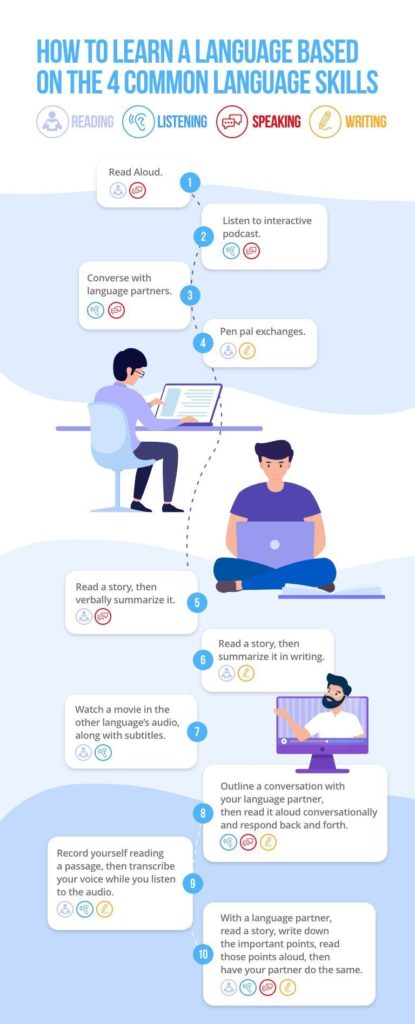Having the desire to learn a new language is entirely normal and could even be a necessity for success in some educational or work environments like sports, translation, language courses, etc. Some people are drawn to a language for romantic or sentimental reasons. A few years ago, a friend developed a deep love for the Spanish language and wasn’t satisfied until she eventually learned to speak it fluently. Feeling stressed about learning a new language? Looking to boost your career with a new skill? Here are 5 easy tricks to help build your vocabulary and get a good grasp of your desired foreign language.
The ability of a person to speak two languages is referred to as being “bilingual” and in some countries (e.g. South Africa, Nigeria, India, Ghana, etc.), citizens are “natural bilingual speakers” as they speak both the language of their tribe and their official national language.
However, having the ability to speak a country’s lingua franca (common language) is essential especially if you’re there for work, travel or business purposes, allowing you to get around and communicate with ease. Learning a new language helps you adapt to the demands of a globalized world and builds your confidence when faced with new environments or scenarios.
Before offering a few tips and tricks for language learning, here are a few reasons why you should learn as many foreign languages as you can:
Learning a New Language Yields Opportunities for Expanding Your Business and Gaining New Clients
If a business website is only provided in English, it is unlikely that the business will be gaining many non-English-speaking clients. Bilingualism helps you stay competitive in business as above 50% of the top businesses in the United States now have invested in website translation. A professional translator can help build confidence with foreign clients, helping the business to appear professional and emphasizing their international merit.
Learning a New Language Is a Necessity for Translators or Interpreters as This Massively Improves the Chances of Recruitment
Jobs for Translators are on the rise yearly with the expectation of about 26,000 translator jobs available in the United States by 2020. Translators are also a necessary part of sectors like tourism, healthcare, and national security. To work in translation, it’s advisable you get certified or accredited, pass language proficiency tests, gain experience translating for clients and remember to keep practicing!
General Life Improvement
Learning and consequently being able to speak a new language can be fun, opening up new doors both socially and professionally speaking. It’s also worth noting that companies value bilingual employees, who have the possibility to earn slightly more than their monolingual colleagues. Additionally, bilinguals also show improved levels of problem-solving, decision-making and multitasking as learning a new language isn’t just a new way of speaking, but often a whole new way of thinking.
Health Benefits
Reports from several coordinated studies show evidence that the improvements in cognition from learning a new language could help slow down the general mental effects of old age like Dementia and the early onset of Alzheimer’s disease.
It’s never too late to decide to learn a new language, and the benefits are endless! Now you have a few reasons to start learning a language today, here are five important tips to build your vocabulary in any foreign language of your choice.
5 of the Quickest Ways to Build Vocabulary
Set a Practice Schedule
If you are serious about learning a new language, it’s crucial that you put aside enough time for learning, as trying to fit in learning within your few moments of spare time can actually be counterproductive. Getting into the habit of practicing a new language at a set time trains your brain to absorb new information. That’s why learning in a language school or online classes really produces the best results. Having a few of these materials to hand can make things easier: a notebook, an alphabet guide, a dictionary, tutorial tapes, etc.
Having a practice schedule helps you stay focused and avoid procrastination. The average brain learns 10-20 new words per hour. Make sure you avoid cramming too much at once as you could forget much more than you remember. You have plenty of time to learn, there’s no rush!
Visualize and Learn in Context
Visualizing in this case refers to relating new words to objects that help you remember them faster, so you can use them in real life situations. New vocabulary isn’t much use to you if you can’t correctly use it in a sentence. What I advise is finding a phrase in your native language and its translation in your target language.
For example, if you learn the German word for “mall”, Einkaufszentrum, learn the English sentence “Where is the mall?” and its German translation “wo ist das Einkaufszentrum”. You can always start with greetings like “How are you?”, “nice to meet you” and gradually expand to lengthier phrases. The key is to have a particular word or words in mind and forming a phrase around it.
Find a Native Speaker or a Bilingual Environment if Possible
It is always a good idea to find a language tutor, that’d be preferable as they would be committed to helping your progress. However, in lieu of that option, you can always befriend native speakers, express to them your love for their language and practice your conversation skills. This will boost both your vocabulary, fluency and improve your pronunciation.
Studies show that natural bilingual speakers learn and think faster, and it is also proven that they learn well not just from bilingual tutors, but in bilingual environments. If you want your kids to learn new languages, placing them in bilingual environments where topics are taught in both languages teaches the brain that both languages are equally important.
Watch Movies or Tutorials
Remember that the learning process isn’t all about hard work, and can be fun too! If you’re a movie fan, you can watch movies in your desired language with or without subtitles. This has a dual advantage of reinforcing words you have previously practiced or learned, introducing new phrases and contexts in which you can use vocabulary and improving your pronunciation skills as you could mimic the actors until you get it right.
Why not try downloading music in your target language and sing along with the artists? Make sure to check the lyrics and note down new vocabulary.
While surfing the internet, you can quickly find tutorial videos to complement your daily language lessons. You can never get enough of hearing the new language, as the brain is reinforced each time you hear words you have studied previously and commits them to memory.
Practice Often
Vocabulary building is, as the name entails, is a gradual constructive process. Make use of flashcards, post-it notes, lists, etc. to ensure that you do not lose what you have learned.
Read as many books in the new language as you can find, and find opportunities to speak with natives. You’ll soon receive compliments on how well you speak the language, and you can use this as motivation to drive your onward progress. Try changing the language setting on your phone to your new language, prompting you to recognize new words and phrases.
In conclusion, the more you study, the more you know, and the more you know, the further you go. Remember, learning a language requires time and effort, but the rewards are well worth the hard work. Learning a new language is a decision you will never regret. Languages form a crucial part of global communication, for translation agencies, businesses and language learners alike!






